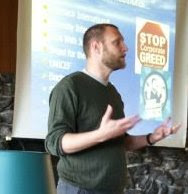Hymn for Nonviolence
(3) Though an army encamp against me, my heart shall not fear.
(6) Now my head is lifted up above my enemies all around me, and I will offer in God's tent sacrifices with shouts of joy; I will sing and make melody to the Lord.
(10) If my father and mother forsake me, the Lord will take me up.
(11) ... lead me on a level path because of my enemies.
(12) ... they are breathing out violence.
(13) I believe that I shall see the goodness of the Lord in the land of the living.
(14) ... be strong, and let your heart take courage; wait for the Lord!
This psalm is one of extraordinary confidence. It is more than hope, but less than casual certainty. Most of all, however, it is a hymn of nonviolence in the face of violence. Though enemies surround and attack, the psalmist here chooses to worship and sing for joy rather than fight.
What's more, the psalmist wants to grow in the Lord through her enemies: in verse eleven, perhaps the most inspiring verse in addition to the final stanza, the psalmist asks that the enemy be instructive to her, that the enemy teach her something, that the Lord open her heart to see herself through the eyes of her enemy. Oh, that American Christians would pray earnestly to see themselves through the eyes of their enemies, that they would ask God to help them transform themselves through an encounter with their enemies! This is an incredible line.
The psalmist is singing a daring hymn - confident in God's ability to transform people, and not being primarily concerned for one's own physical safety at the hands of an enemy, but being concerned with one's own transformation in light of God and one's enemy. What would happen if American Christianity turned around and instead of supporting horrific violence against their supposed enemies in certain Islamic factions, asked to see themselves through their "enemies'" eyes, asked how they could change to meet their enemies' desires? What if American Christianity's first reaction was not to reach for the gun or aircraft carrier group, but to reach for our enemy and embrace them for a moment - recognize their worth, their perspective, their experience - and not be so preoccupied with securing our own physical safety. (The irony is clear: risking our personal safety then would actually secure it in the long run; while the opposite strategy is proving a terrible failure: secure our physical safety first - through the denial of such safety to others - is costing us our safety for generations to come.)
What if, when surrounded by armies, we Christians chose to worship and sing songs of joy, rather than fight?
This hymn gives us hope, speaks of confidence in God's power. It places the confession in our mouths: "I believe that I shall see the goodness of the Lord in the land of living." These are not idle words, not easy words - they don't rush to our mouths in the heat of approaching battle. When faced with an enemy, it is easy (and cheap) to speak bravado and boasting, to speak of vengeance and power. How much more difficult (and costly) is it to speak love on the battlefield?
What if, when "terrorists" charge at us, Christians waited... just waited a moment? "Wait for the Lord; be strong, and let your heart take courage." Just wait a second! Slow down. Think about what we're doing, about how we're reacting, about the possible legitimacy of our enemies' grievances. Wait. "Wait for the Lord."
In this psalm we have preserved for us a precious jewel in the foundations of our faith tradition. Even in that violent, tentative time and culture, we have here an articulation of a fundamental conviction that stands in contrast with the bulk of human discussion. Perhaps, when asking ourselves which voice to follow, we should look at these exceptions with special care - and ask ourselves which genuinely represent the mind and will of God.
Christians may find ourselves standing on the wrong side of things.


